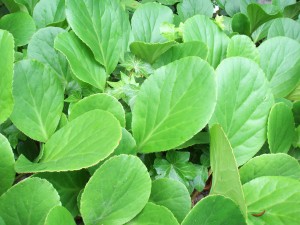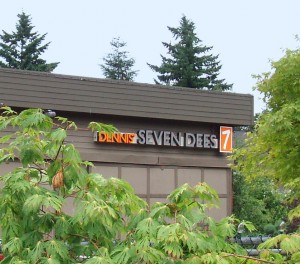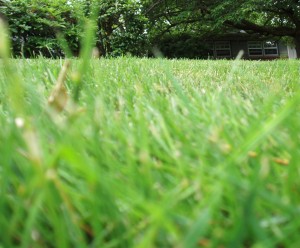 Though you wouldn’t know it today to look out my window (cloudy & some drizzle), it is summer, sunbeams have been out in force, and temps have been shooting up along with the plants in our yards and gardens. Some of this has to do with the heat, and some has to do with the fact that we are watering things while there is heat. At this time of year, and especially during a recession, we all need a refresher course on watering, and Lake Oswego is only too happy to oblige!
Though you wouldn’t know it today to look out my window (cloudy & some drizzle), it is summer, sunbeams have been out in force, and temps have been shooting up along with the plants in our yards and gardens. Some of this has to do with the heat, and some has to do with the fact that we are watering things while there is heat. At this time of year, and especially during a recession, we all need a refresher course on watering, and Lake Oswego is only too happy to oblige!
 Water conservation experts from the Regional Water Providers Consortium (RWPC) are visiting Lake Oswego for a session with local residents where they plan to hand out free water gauges and lots of good tips for water-efficient landscaping and maintenance. This event will be held this Saturday, June 13th, at Dennis’ 7 Dees Garden Center, 1090 McVey Ave., from 10 AM to 2 PM.
Water conservation experts from the Regional Water Providers Consortium (RWPC) are visiting Lake Oswego for a session with local residents where they plan to hand out free water gauges and lots of good tips for water-efficient landscaping and maintenance. This event will be held this Saturday, June 13th, at Dennis’ 7 Dees Garden Center, 1090 McVey Ave., from 10 AM to 2 PM.
The Consortium has an amazing website that reminds me how much there  is to learn. I remember thinking, when I was much younger and of course knew much more than I do today (or thought I did), that being a native of Southern California (Hey… No ribbing… I’ve been here since 1978!) , I had a very hard time believing that there was truly any need to conserve water in Oregon… I mean come on! With all the rainfall, the huge river running through town, the snowy mountain peaks dribbling water through Portland all year long… How was I supposed to believe that we actually needed to pay much attention at all to water consumption? Well, in recent years we have all learned how integral our activities are to maintaining the living environment we so cherish and want to hand to our children. There really are limits to what nature can provide us in our current numbers & given the constraints of our infrastructure. Then, there is that money thing… Practical tips for saving money while saving water? I’m all ears!
is to learn. I remember thinking, when I was much younger and of course knew much more than I do today (or thought I did), that being a native of Southern California (Hey… No ribbing… I’ve been here since 1978!) , I had a very hard time believing that there was truly any need to conserve water in Oregon… I mean come on! With all the rainfall, the huge river running through town, the snowy mountain peaks dribbling water through Portland all year long… How was I supposed to believe that we actually needed to pay much attention at all to water consumption? Well, in recent years we have all learned how integral our activities are to maintaining the living environment we so cherish and want to hand to our children. There really are limits to what nature can provide us in our current numbers & given the constraints of our infrastructure. Then, there is that money thing… Practical tips for saving money while saving water? I’m all ears!
Among the vast array of uselful material to be found at the RWPC site are the following good pieces of information:
- Use Mulch! It is important to know what kind to use however: –Organic Mulches (aged manure, bark chips, wood chips) and compost material will significantly decrease the amount of water you will need for plant health. Specifically, the addition of as little as 5% organic material can quadruple your soil’s ability to store water, decreasing the watering needed. – Inorganic mulches like stones, concrete and gravel can be great for creating landscape patterns etc., but also “re-radiate” the sun’s heat and cause an increase in the amount of water needed to care for surrounding plants.
- Create Watering Zones – These would be areas of your property wherein similar types of plants reside hopefully having similar watering requirements. (Lawn areas, rose garden, annual garden, perennial garden etc) This way you avoid the “one system fits all” mentality and the over-watering that results for some garden areas.
- Adjust Watering Schedules Frequently – As the temperatures shift during the summer, you will want to adjust your watering schedules accordingly.
- Managed Stress in the Landscape – There are all sorts of seemingly complicated formulas to help you determine how much to water a lawn at any given temperature. The RWPC site simplifies this information and helps you understand the “Stressing” concept, which basically means watering as little as possible forcing lawns to use their natural coping mechanisms and give you a green lawn all summer without the heavy over-watering that is so prevalent.
- Water Plants Thoroughly but Infrequently – This causes roots to go deeper and therefore be more drought resistant/require less watering.
- Water When Temps are Cooler – Preferably before 10:00AM or after 6:00PM.
- Use Drip Irrigation Where Possible – Large water droplets close to the ground are much more efficient than sprinkler systems which lose a lot of water to evaporation.
- Don’t Water in the Rain – Use rain sensors and gauges to eliminate unnecessary automatic watering when it is raining.
